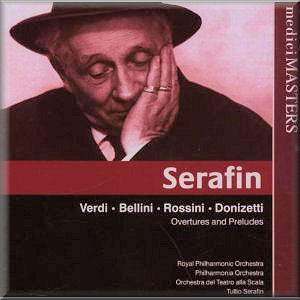 |
 |
|


alternatively
CD:
AmazonUK
AmazonUS
|
Overtures and Preludes
Giuseppe VERDI (1813-1901)
Les vêpres siciliennes: Overture (1855) [9:12]¹
La traviata: Prelude to Act I (1853) [4:37]¹
La traviata: Prelude to Act III (1853) [5:06]¹
La forza del destino: Overture (1862) [7:55]¹
Nabucco: Overture (1842) [8:17]²
Aïda: Prelude to Act I (1871) [4:10]²
Vincenzo BELLINI (1801-1835)
Norma: Overture (1831) [5:33]³
Norma: Prelude to Act III (1831) [3:49]*
Gioacchino ROSSINI (1792-1868)
La cenerentola: Overture (1817) [8:27]³
Gaetano DONIZETTI (1797-1848)
Linda di Chamounix: Overture (1842) [7:09]³
Don Pasquale: Overture (1843) [8:44]³
 ¹Royal Philharmonic Orchestra, ² ³Philharmonia Orchestra, *Orchestra
del Teatro alla Scala/Tullio Serafin
¹Royal Philharmonic Orchestra, ² ³Philharmonia Orchestra, *Orchestra
del Teatro alla Scala/Tullio Serafin
rec. ¹Kingsway Hall, 1959; Abbey Road Studio No. 1, ²February 1959,
³April 1961; *Teatro alla Scala, Milan, September 1960
 MEDICI MASTERS MM008-2 [71:57]
MEDICI MASTERS MM008-2 [71:57] 
|
|
|
A conductor who works extensively in the opera house is likely
to develop a different feeling for the overtures and preludes,
bound up with their role in the overall drama. The better items
in this program, led by veteran conductor Serafin, bear this
out.
The overture to La forza del destino is an effective
piece when played for sheer brilliance; Serafin also finds dignity
in it, along with a dramatic arc. Two passages in particular
stand out. His treatment of the clarinet theme at 4:00 is unusually
relaxed - Verdi requests Allegro brillante - but the
player has time to "sing", and the textures are spacious.
Some pages later, at 5:08, the conductor draws a sharp, and
effective, contrast between the solemn brass chorale and the
strings' energetic answering phrases. Such insights compensate
for some stiff transitional ritards earlier in the piece.
It's good to have the two Norma selections, though it's
clear why they don't get much play on their own, even on disc.
The overture is more a series of loosely bound dramatic gestures,
proceeding in fits and starts, than a full-fledged, stand-alone
concert piece. Similarly, the third act prelude is beautiful,
but, not being followed here by the third act, it fades away
inconclusively. The Philharmonia is rhythmically alert in the
overture, while the Scala forces bring comparable polish to
the prelude.
The Donizetti overtures, too, are a nice change of pace from
the familiar Rossini. The lithe urgency with which Serafin invests
the body of the Linda di Chamounix carries the
listener past the variously skittish, unkempt timing of all
the rolling upbeats. A similar energy infuses the cheerful,
and neater, Don Pasquale, once past the opening, where
the cello soloist seems uncertain about the rubato. Here is
where players who understand the style can make a difference:
on an Erato LP program (Musical Heritage Society in the U.S.),
the Monte Carlo Opera Orchestra - a lesser ensemble, to be sure
- gave Claudio Scimone more comfortably idiomatic playing.
Among the other Philharmonia selections, the Aïda is
pleasant and unexceptionable. In the otherwise well-ordered
Nabucco, Serafin inexplicably slams on the brakes at
6:27, as if to allow for more time to articulate - did the Philharmonia
strings really need it? - and never quite recovers the initial
tempo. Another such distracting meno mosso, beginning
at 3:40 of the Cenerentola, sounds more an interpretive
than a practical choice, but it kills the momentum equally well.
Finally, there's no getting around it: the first three Verdi
selections are just awful. The same RPO that played the Forza
so confidently here can't seem to understand the conductor's
beat, or his musical intentions. The double pickups in the Vespri
introduction are nervous, and rarely together; in the tuttis,
the violins consistently race ahead of everyone else. The two
Traviata preludes move more slowly, but the textures
are that much more exposed, as is the tentative ensemble. The
violins sound lovely when inhabiting the higher positions but
too much else goes by the board. In the third-act prelude, Serafin
takes the big theme broadly. At first, it suggests sustained
concentration, but the continuity begins to lapse - within phrases
as well as between them - and the music doesn't cohere.
I can't really recommend this program as a whole. Indeed, I'm
surprised the first three selections were passed for LP release
in the first place. That said, there's some good music, and
some good music-making, to be found. It's your call.
Stephen Francis Vasta
|
|




 All Nimbus reviews
All Nimbus reviews








